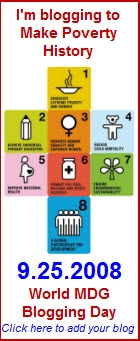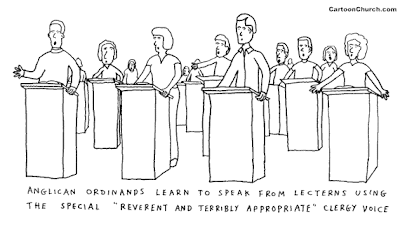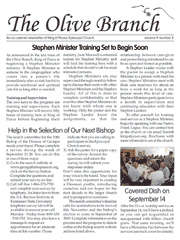Below is today's religion column for the
Tribune & Georgian written by the Rev. Maryann McFadden Meador. She reports on visiting churches in Camden County and not finding them welcoming. While she does not refer to King of Peace, she did visit our church and we are one of the many churches in the county she refers to in the article which follows. Comments are, as always, highly encouraged. What do y'all think of her experiences?
For the past 16 years, I have served in a pastoral role in United Methodist churches in 3 states: New Jersey, Texas, and Illinois. I took an active part in the introduction of the church’s “Igniting Ministries” outreach campaign and always spoke with my congregations about the need to welcome visitors warmly and make efforts to invite them to be part of the church community.
I encouraged people to follow the “60 second rule”, that is, to spend the first 60 seconds at the end of worship speaking with a person whom they did not already know. I formed ministry teams of folks whose calling it was to seek out and welcome visitors, giving them a small gift from the church. Every Monday, I sent letters to everyone who visited on Sunday, if they had signed the pew pads, as requested. I always included the “passing of the peace” as an important part of worship and again, encouraged people to greet newcomers, and not just speak with their friends. Whether or not they ultimately joined the church, I was pretty sure that visitors were greeted and spoken with when they visited. Once or twice, I even had to discourage congregation members from “swarming” and overwhelming visitors.
Then I got to be a visitor. I was granted family leave from my conference and moved to another conference, and had the chance to visit other churches – to “church shop”, if you will, for the first time in 16 years. My plan was to not tell people that I was a pastor, but to simply visit a different church each Sunday, and to sit in the pews and worship God, just like a “regular” person.
In so doing, I became that sought after, spoken of, “visitor” and got to experience first hand what it feels like to be a stranger in church. Each week, I selected another church at which to worship, either by looking through the local newspaper or simply by driving by and noticing a church. I wanted to experience worship in denominations and traditions different from my own, as well as my own, and I was excited about the journey. I was excited to hear good sermons – other than my own. I was excited to meet new people.
But first, I had to determine at what time the worship service was held. And that was not always as easy as it sounds. One church’s sign said they worshipped at 10 AM. I arrived at 9:55 AM and found the place empty. Turns out they worship at 11 AM, but nobody ever changed the sign. I went somewhere else that Sunday.
Another church did not list the time of worship on their sign, so I “googled “ them, checked their website, and believe it or not, no worship time was listed there, either. Undaunted, I called the church office phone on Saturday evening, hoping that the answering machine message would give me the needed information. Again, no such luck. You would think that finding this type of information would be a “no-brainer”, wouldn’t you? I couldn’t help but wonder if these churches were really interested in having visitors, or if it was a closed club.
But I persisted. And visit I did. And it was scary. Scary to enter a strange building by myself: “Is that the front entrance?” “Where am I supposed to park?” “Will anyone speak with me?” “Should I say “good morning” to everyone as I always did as the pastor, or wait to for them to speak to me?”
Most of the time, an officially designated “greeter” stood at the church door, smiled, shook my hand, wished me a good morning, and handed me a worship bulletin. So far, so good. Now, where is the sanctuary?
I experienced many types of worship. There was the contemporary service, with a praise band and lyrics projected on a large screen. It was high energy, and well attended, but I had never heard any of the songs before, and more importantly, no one spoke with me. Then again, no one spoke to anyone else either. I seemed to be in a church service full of strangers. I was visiting churches to worship God, but also to find and become part of a Christian community. Other than the officially designated greeter, no one else looked at me, spoke with me, gave me a gift, or thanked me for coming. I felt ignored.
Then there was the more traditional Christian service. Familiar, well loved hymns, a structured service, a good sermon, a beautiful worship facility. I felt very much at home. But no one spoke with me. I even hung around at what seemed to be a coffee hour after worship (though it was never formally announced that it was a coffee hour, and I neither saw nor was offered any coffee)—looking lost, and obviously new. There were no more than 70 people in worship, and I knew from experience that new folks stand out in a crowd that size. Still, no one spoke with me. By now, I was yearning for connection and community, and so, I initiated conversation with several folks around me. Maybe they were just shy, and I would have to break the ice. No dice. Each of my conversational gambits were met with polite smiles and turned backs. I was sure I had brushed my teeth and applied deodorant that morning. Oh well, maybe if they saw me a few times, they would warm up. After my third visit, the pastor spoke with me; he obviously recognized me and smiled and wished me a good morning. Good for him, but the pastor is not the church.
I visited several churches more than once. I heard some really wonderful sermons, and some great and not so great music and singing. I was uplifted and challenged and inspired. But not welcomed.
Until I decided to step way outside of my comfort zone and visit an all black United Methodist Church. By myself. ( I am not African American). And there, I experienced the warmest, most wonderful, welcoming experience of my journey. I was greeted, hugged, welcomed, and truly felt like the people were glad that I was with them. Just about everyone made a point of speaking to me, and telling me that they were pleased that I was there. We worshipped God exuberantly and extravagantly, with singing and clapping and shouting and great joy. I felt like I had come home. I felt like I had gotten very near to the kingdom.
The pastor reached out to me the following day, and we struck up a friendship. She invited me to preach at the church, and I was honored to do so. Every Sunday that I worship in this church is a joyful experience, a homecoming experience, and I already feel like a part of the community, even though the color of my skin is different.
My experience as a stranger, a visitor, a sojourner, has been exciting, and scary, and eye-opening. I keep hearing the words of Matthew 25:35 echo in my ears: “…for I was hungry, and you gave me food, I was thirsty, and you gave me something to drink, I was a stranger and you welcomed me….” (NRSV)
How welcoming are you to the strangers in your midst?
Rev. Maryann McFadden Meador is an ordained elder in the United Methodist Church and a member in full connection of the Northern Illinois Annual Conference. She is on family leave on absence, and has recently relocated to coastal Georgia.Labels: church, church marketing, hospitality
I say my prayers and then cast my votes. I know that faithful Christians often disagree on the best candidate and this is just fine. This side of the kingdom of God, no earthly power is going to get it all right all the time anyway. And God will work in and through any person of any background and will work in spite of any person of any background. This is not to say that for whom we vote is of no consequence, but to say that we can not and will not usher in heaven on earth no matter who lives in the governor’s mansion or the White House. However in hindsight it is clear the church did not speak up loud enough or strongly enough against Hilter and Mussolini and it ushered in hell on earth for millions.
 Now the father's heart overflowed with such love for his son that he offered his own blood, though he knew it would cost him his own life. So by the sacrificial love of his father, the young man was given new life.
Now the father's heart overflowed with such love for his son that he offered his own blood, though he knew it would cost him his own life. So by the sacrificial love of his father, the young man was given new life. 





 The leader of Bajrang Dal was trying to convert Dalit and Tribal Christians forcibly back to Hinduism and was shot dead by a member of a Maoist group. Because this Maoist group includes Christian Tribal people among its membership it was interpreted by extremist Hindus as a Christian attack on a Hindu leader. As a result Christians were attacked in return - suffering loss of life (more than 30 dead), loss of property and forced flight, and in some cases forced conversion to Hinduism. The attacks have now also spread to Mangalore in Karnataka state. Although there are anti-Christian incidents on a regular basis in these states (and others such as Gujarat and Uttar Pradesh) the recent attacks appear to be the most serious violence against the Christian community in the last 50 years....
The leader of Bajrang Dal was trying to convert Dalit and Tribal Christians forcibly back to Hinduism and was shot dead by a member of a Maoist group. Because this Maoist group includes Christian Tribal people among its membership it was interpreted by extremist Hindus as a Christian attack on a Hindu leader. As a result Christians were attacked in return - suffering loss of life (more than 30 dead), loss of property and forced flight, and in some cases forced conversion to Hinduism. The attacks have now also spread to Mangalore in Karnataka state. Although there are anti-Christian incidents on a regular basis in these states (and others such as Gujarat and Uttar Pradesh) the recent attacks appear to be the most serious violence against the Christian community in the last 50 years....








 Oh it’s no picnic. The landowner expects you to work. After all, Jesus compared the kingdom of heaven to working in a vineyard, not to a pleasure cruise. A Bishop I know once said the cruise ship analogy might work for the Christian life, but the ship would be for crew only. A working vacation at best. No lounging about in the deck chairs. That’s why Jesus prefers the image of workers in a vineyard. The landowner has expectations of you Jordan.
Oh it’s no picnic. The landowner expects you to work. After all, Jesus compared the kingdom of heaven to working in a vineyard, not to a pleasure cruise. A Bishop I know once said the cruise ship analogy might work for the Christian life, but the ship would be for crew only. A working vacation at best. No lounging about in the deck chairs. That’s why Jesus prefers the image of workers in a vineyard. The landowner has expectations of you Jordan. 





































2 Comments:
At 9/30/2008 7:05 AM, Anonymous said…
Anonymous said…
No politics at the pulpit please!
There is so much tension with this political campaign already. I don't want to feel that in my place of worship.
When I go to church, I want to calm my anxieties about all of the issues so that I am able to pray about them rather than worry.
At 10/01/2008 6:42 AM, anything but typical said…
anything but typical said…
I agree. The purpose of the church is to advance God's kingdom. The church should be above politics as usual, and should be about God's business. I've been in churches where Chrisitian organizations distributed voting guides and statemenets were made from the pulpit regarding candidates. It made me very uncomfortable - not because of the separation of church and state issue - but because it demeans those who believe things should be done a different way.
After all, contrary to popular opinion, conservatives and liberals basically want the same things. We both want a safe, smart, and prosperous America. We just disagree on how to get that done. Part of the acrimony of in our system is in that disagreement, and part is greed for power on BOTH sides of the aisle. I don't want my church to be involved in either side.
I want the church to point the way to peaceful cooperation and be the example. The church should be there to remind us that the important things are to love God with all our hearts, minds, and strength, and to love our neighbors as ourselves. It is up to each individual to listen to God's voice in her life as to how to do that.
Post a Comment
<< Home